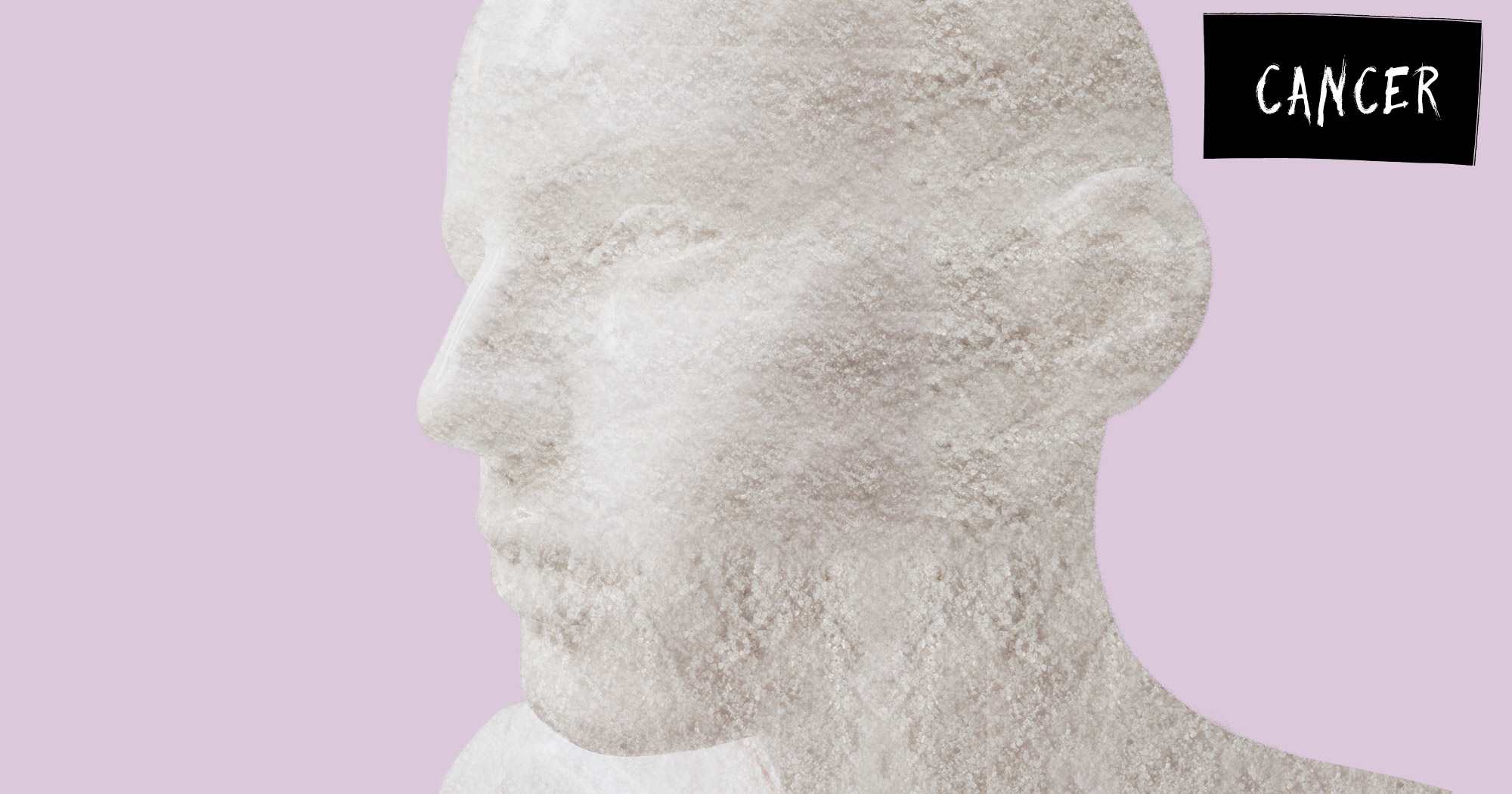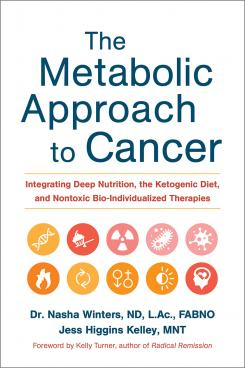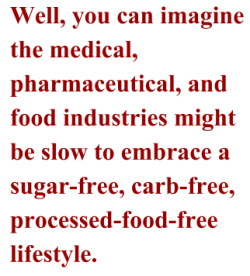Screw Cancer and the Sugar It Rode In On

My father died of cancer at 53. My mother barely survived breast cancer at 45. And like a dutiful son, I caught the cancer bug last year at 53—stage 4 throat cancer—it’s a family thing.
Lots and lots of families. One hundred years ago the chances of getting cancer were about one in twenty. Today, a mind-boggling 50 percent of men will get the disease in their lifetimes, and 35 percent of women. And while cancer specialists are getting pretty good at treating cancer once it materializes in the body, the medical industry is piss-poor at helping to prevent it from occurring in the first place.
According to the lab reports, my cancer was caused by HPV, the sexually transmitted human papillomavirus. Perhaps because I smoked a cigar daily or drank more than the recommended amount of wine, the virus conspired with cancer cells in my right tonsil and then moved into the lymph glands in my neck, sprouting a walnut-sized tumor under my ear. While the lump just seemingly appeared one morning, chances are the cancer developed many months earlier.
So late last January, 2016, I was diagnosed and proceeded to spend the next seven weeks getting pummeled by chemo and radiation, with the months after devoted to gaining back weight, strength, and a sense of taste—as well as that little matter of mojo because chemo is a total mind fuck. From the first tingles of feeling the platinum cocktail enter my body via IV to the seventieth hour of nausea afterwards, even the thought of chemo chills my bones all these months later. But I got through it better than most and a PET scan a couple months later confirmed I was cancer free, for the time being.
What I Learned During Recovery
I’m setting these thoughts down on paper not because I want to scare you with details of my experience as much as I want to share some of what I learned during my recovery. In the main, I came to realize that the cancer specialists who saved my life, the conflicting health information reported daily in the media, the norms and habits of American society in the twenty-first century—all of those entities and information sources didn’t begin to offer what I felt I needed to stay healthy and cancer free for the rest of my life.
I needed to own my health. To take responsibility. And that’s the attitude I’m hoping to share with you. I’ll feel great if anything I say moves you to make some lifestyle changes to improve your own odds of avoiding cancer. But I also know—and this is not a caveat or a sign of hesitation on my part—the science and recommendations I’m citing are NOT sanctioned by the American Medical Association, the American Cancer Society, and all the other top medical organizations. I emphatically encourage you to do your own research, whether you have cancer or not. Remember, 50 percent of men, 35 percent of women, and the odds seem to be worsening.
In my case, I know another tumor might show up on my neck tomorrow. Cancer survivors are walking time bombs in the first few years after being declared cancer-free. The disease loves to revisit.
A Key Book Lands on My Desk

So I was committed to the fight, and when a copy of The Metabolic Approach to Cancer landed on my desk, it proved to be one of the key pieces I needed to revamp my lifestyle and diet. Foremost, it offered the most convincing explanation for why cancer is affecting far more people than ever before, as well as a primer on how cancer behaves in the body and how to slay it.
We all have cancer cells in our bodies and gads of research show that damaged mitochondria in our cells is the trigger that allows cancer to take command of these formerly healthy cells and run amok. (Mitochondria are the little engines in our cells that convert food into energy.) The million dollar question is what’s causing the damage to our mitochondria? Pesticides, herbicides, synthetic fats, preservatives, antibiotics, chronic stress to name a few diet and lifestyle factors mentioned by coauthors Dr. Nasha Winters and Jess Higgins Kelly in the intro to The Metabolic Approach to Cancer. But my ears really perked up when they started to explain the metabolism of a cancer cell.
Cancer cells use a simple fermentation process to convert glucose (carbohydrates) into the energy (sugar) they need to thrive. And while, cancer is wily and adaptable in its ability to survive in the body, sugar is its go-to fuel—sugar in the form of grains and rice (bread, pasta, crackers, etc.), potatoes, and other starches, as well as processed sugar, fruit juices, honey, and other sweeteners. All that stuff is cancer food.
Enter to win a collection of books from the American Cancer Society.
Here’s the shocking part: cancer cells can’t burn fat. They need sugar. But you don’t. Your cells are fine burning fat (and oils) for energy. When your cells make the transition to fat burning, you enter a natural and desirable state of ketosis, the same as newborn babies when they exclusively feed on breast milk, with its super high fat content.
An ovarian cancer survivor, Dr. Winters has been studying cancer and treating her patients with innovative diet-related cancer treatment protocols for more than twenty-five years. She has worked with hundreds of stage IV cancer patients and watched them live far longer than they were told they would by other cancer specialists. Here’s the key to her approach: “since cancer consists of cells gone awry in response to toxic diets and environments, we must optimize the body’s healing mechanisms … we must treat the terrain, not the tumor. We must build the body up instead of attacking it.” She and Kelly identified ten hallmarks of cancer, and developed ten approaches that are “dedicated to the science of using therapeutic nutrition to positively impact metabolism, creating an inhospitable environment for cancer while simultaneously removing dietary and lifestyle factors that provoke it.”
Again, 50 percent of men and 35 percent of women will get cancer in their lifetime. Cancer is sizing you up right now. What will you do to prevent it?
Sugar-Carb-Cancer Connection
Over the past hundred years, many dozens of expert studies have made the sugar-carb-cancer connection, but only recently have these particular diet studies been organized and evaluated together.

So why hasn’t the word spread faster? Well, you can imagine the medical, pharmaceutical, and food industries might be slow to embrace a sugar-free, carb-free, processed-food-free lifestyle. But they haven’t exactly been suppressing the information. It’s more along the lines of how cigarette manufacturers and oil companies reacted to research damning their industries: More studies are needed!, they proclaim, seemingly hoping to delay the inevitable. Anyway, I’m not going to theorize on why the corporate powers that be haven’t weighed in on the subject of cancer’s metabolism, ketosis, and the like, other than to say, they know who their daddy is.
But if you’ve been paying attention at all, you realize our medical industry is a cesspool of conflicted interests at all levels—a condition further exacerbated by head-in-the-sand-itis. Just as it’s hugely difficult to change a man’s mind when his paycheck is at stake, it’s vastly more difficult to pressure multi billion dollar industries to reverse course, even if millions of lives depend upon it.
Here’s an example. In the dog days of chemo and radiation, my appetite was shot, nausea was omnipresent, and I was gradually losing weight and strength. My oncologist, the radiology technicians, and the others involved in my treatment were all concerned. They encouraged me to eat more, to do whatever it took to consume more calories—milkshakes, Ensure, pasta, jello pudding. Keep your weight on, man! Well, what are milkshakes and Ensure, pasta and the like packed with? Yes, carbs/sugar. Cancer food. At that time when my body was weakest, my docs were prescribing the one and only fuel my assassin needed to close the deal.
I got through radiation and chemo extremely well, according to my oncologist. He couldn’t remember another patient who was jogging a couple miles a day on a treadmill and walking twenty-five minutes across town to the cancer center during the last days of treatment. Frankly, most days, I didn’t want to jog or walk or do anything. I felt like shit. But my mindset was to never let myself act like a patient, to never feel sorry for myself, even during those many hours and days when I was in a fetal position on the couch with tears in my eyes. Soldier on. Tomorrow’s another day. Pick a cliche, I used it and I got through it.
But here’s the qualifier: every radiation and chemo session brought me in contact with other cancer patients in far, far worse shape than me. I was humbled everyday. You want to see some courageous, pain tolerant people, go visit the chemo ward at a cancer hospital.
And one day a couple months ago, during a follow up appointment with my oncologist, I asked him about cancer and sugar, fat and ketosis. What did he think of the metabolic approach to cancer? Instantly, he flinched and sighed and made mention of several cancer diets—none proven, he’s read all the research—but if it’s working for you, and it seems to be, keep it up. He was flippant and uncomfortable and I quickly changed the subject. That experience was chilling to me because he was a young doc, a guy I had talked at length about shared interests like running marathons and jigging for whitefish, and yet, he didn’t hesitate to pull the doctor card and dismiss me with a flip of his wrist. In retrospect, I realize he is what he is—a loyal member of a profitable industry charged with treating cancer, not preventing it.
Committed to Ketogenic
Forgive me for skimming over certain details and some of the science behind cancer research. My goal is to spark your interest, without haranguing or getting overly wordy. And while I feel 100 percent confident about these cancer theories, I’m no doctor or scientist. I am, however, relying on the expertise of doctors and scientists who had the courage to challenge their colleagues and turn their back on a broken system.


But don’t forget that I might be biased. I’ve had my big cancer scare, and I’ve spent months and months cobbling together a diet and exercise routine that works for me. Basically, I avoid almost all carbs and many other foods that don’t pass muster with the ketogenic diet ideas. I’m guided by The Ketogenic Kitchen, another superb, ahead-of-the-crowd project committed to cancer management and prevention. Authored by Patricia Daly and Domini Kemp, both cancer survivors, the book is a bible for understanding the science behind the way individual foods affect our bodies, achieving a metabolic state of ketosis, and ideas for enhancing our immune system. It’s also filled with recipes and meal plans, but I mostly rely on it for a list of Yes foods, Sometimes foods, and No foods.
Let me quickly slip in a shout out of immense admiration to Chelsea Green Publishing, the US publisher of both The Metabolic Approach to Cancer and The Ketogenic Kitchen. In my mind, Chelsea Green personifies what’s best about indie publishing: integrity, innovation, quality, courage, and a brilliant sense for staying years ahead of North American culture. Human Heart, Cosmic Heart, a wildly original and brilliant reexamination of the human heart and its role in the body, is another recent Chelsea Green project that I consider one of the most important books of the last few years.
At first blush, the ketogenic diet is daunting. It took me several weeks to adapt and I’m still tweaking my eating habits to improve energy levels before and after exercise, for example. It’s a fact that I feel very different than I did eighteen months ago. Yes, I feel better, but different is the word.
What I Do and Do Not Eat
Here’s a fairly thorough list of things I don’t eat: rice, potatoes, wheat (bread, pasta, pizza, crackers, tortillas, etc.), corn, oats, beans, tofu, fruit (other than a small handful of berries in protein shakes), milk, processed food, sugar (juices, soda, sports drinks, candy, etc.). What I do eat is lots of vegetables, raw and cooked in any number of ways, eggs, fish (local whitefish and lake trout, salmon), cans of tuna and sardines and anchovies, fish, aged, hard cheese like good parmigiana, goat cheese, and non dairy yogurts and flax milk and vegetable protein powders in shakes.
Full disclosure: Wine is a major ketogenic no-no, but I do drink two or three glasses of dry wine a night. Yes, there’s some carbs in wine, and yes, the alcohol is hard on my liver and kidneys, etc.,—so be it, I’ll compensate in other ways. Wine brings me immense pleasure.
With cancer in my system, I’ll admit to being a bit fanatical about maintaining a healthy diet and lifestyle. Call it the psychic scars from chemo and radiation. But the odds of getting cancer are not in anyone’s favor anymore. Cancer is an indiscriminate hunter. Do I think you should go full keto, or paleo as a preemptive strike against cancer? No. But I strongly encourage you to study the facts. Reconsider the sugar and carbs in your diet. Listen to your body. Don’t completely rely on your doctors for health information. This is on you.

Matt Sutherland is Editor In Chief at Foreword Reviews. You can e-mail him at matt@forewordreviews.com.
Matt Sutherland
